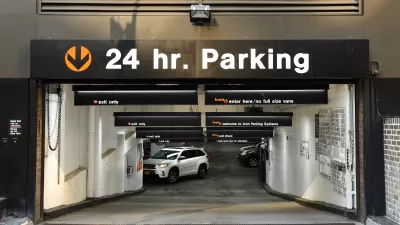Motor vehicles are costly, and every time somebody purchases a car they expect governments to provide roads and businesses to provide parking for its use. A new study totals these costs.

The car is one of the most expensive household consumer goods, yet there is a limited understanding of its private (internal) and social (external) cost per vehicle-km, year, or lifetime of driving. A new article, "The Lifetime Cost of Driving a Car" published in Ecological Economics, provides an overview of 23 private and ten social cost items, and assesses these for three popular car models in Germany for the year 2020.
The study's results confirm that motorists underestimate the full private costs of car ownership, while policymakers and planners underestimate the social costs. For the typical German travel distance of 15,000 car kilometers per year, the total lifetime cost of car ownership (50 years) ranges between €599,082 for an Opel Corsa to €956,798 for a Mercedes GLC. The share of this cost born by society is 41% (€4674 per year) for the Opel Corsa, and 29% (€5273 per year) for the Mercedes GLC. Findings suggest that for low-income groups, private car ownership can represent a cost equal to housing, consuming a large share of disposable income. This creates complexities in perceptions of transport costs, the economic viability of alternative transport modes, and the justification of taxes.
Carlton Reid's summary of this study in Forbes Magazine converts the cost values to American dollars: Lifetime Cost Of Small Car $689,000; Society Subsidizes This Ownership With $275,000.
FULL STORY: Lifetime Cost Of Small Car $689,000; Society Subsidizes This Ownership With $275,000

Maui's Vacation Rental Debate Turns Ugly
Verbal attacks, misinformation campaigns and fistfights plague a high-stakes debate to convert thousands of vacation rentals into long-term housing.

Planetizen Federal Action Tracker
A weekly monitor of how Trump’s orders and actions are impacting planners and planning in America.

In Urban Planning, AI Prompting Could be the New Design Thinking
Creativity has long been key to great urban design. What if we see AI as our new creative partner?

How Trump's HUD Budget Proposal Would Harm Homelessness Response
Experts say the change to the HUD budget would make it more difficult to identify people who are homeless and connect them with services, and to prevent homelessness.

The Vast Potential of the Right-of-Way
One writer argues that the space between two building faces is the most important element of the built environment.

Florida Seniors Face Rising Homelessness Risk
High housing costs are pushing more seniors, many of them on a fixed income, into homelessness.
Urban Design for Planners 1: Software Tools
This six-course series explores essential urban design concepts using open source software and equips planners with the tools they need to participate fully in the urban design process.
Planning for Universal Design
Learn the tools for implementing Universal Design in planning regulations.
Gallatin County Department of Planning & Community Development
Heyer Gruel & Associates PA
JM Goldson LLC
City of Camden Redevelopment Agency
City of Astoria
Transportation Research & Education Center (TREC) at Portland State University
Jefferson Parish Government
Camden Redevelopment Agency
City of Claremont





























